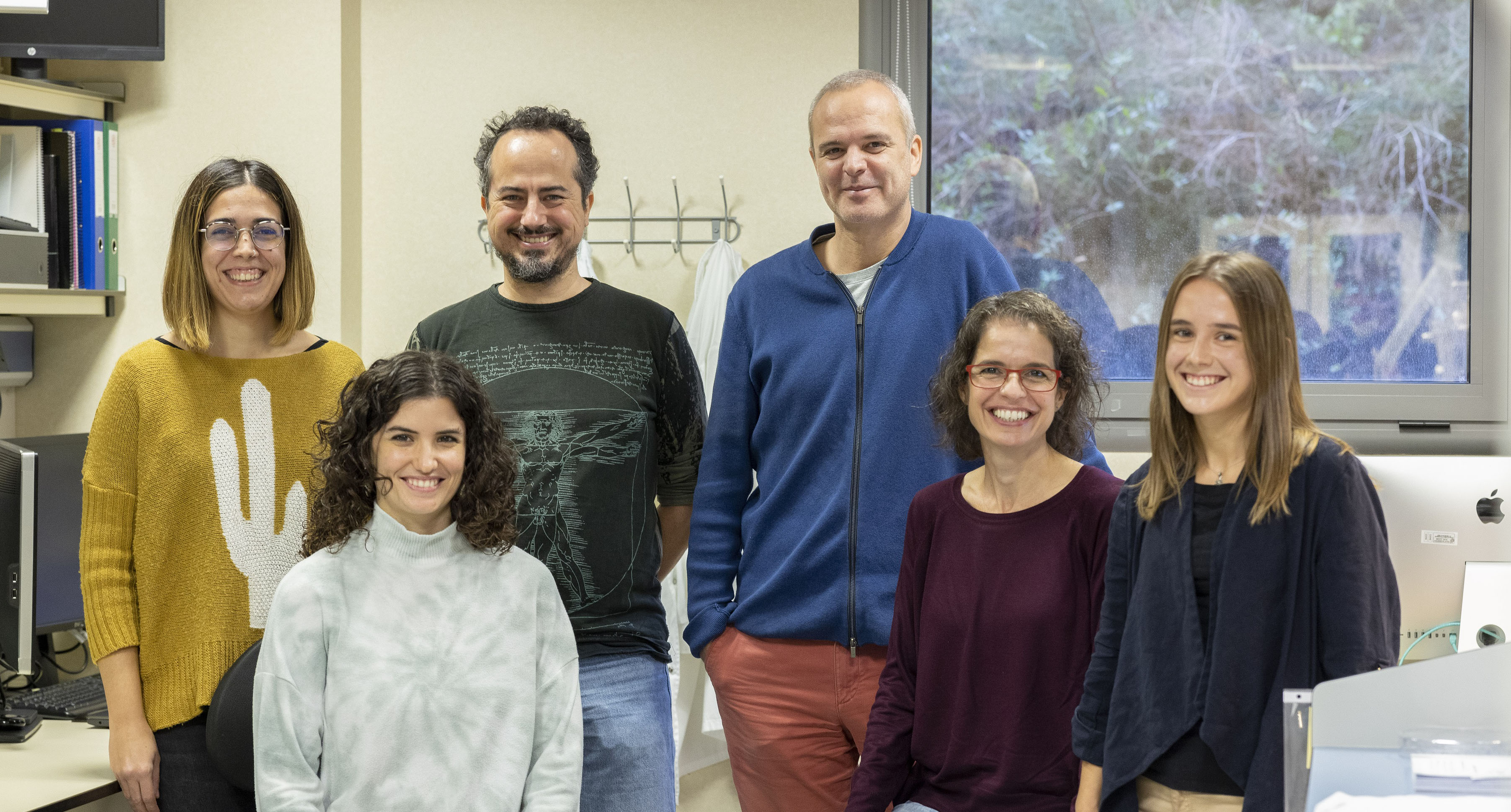About
This research group studies tumours of the peripheral nervous system, other tumours originating from the neural crest and related sarcomas. Many of these tumours develop in the context of cancer predisposition genetic diseases, like neurofibromatosis type 1 or hereditary retinoblastoma, but also in sporadic cases.
The expertise of the group is centered around the genomic and integrative biology analyses of these tumours and the generation of new in vitro/in vivo models to understand their molecular pathogenesis and identify new potential therapies to translate all this knowledge to the clinics. The team collects genomic and epigenomic information of different natures, whole genome sequencing, RNA-seq, etc, from tumor tissues and multicellular models to single-cells, and integrate all this data by performing a careful and craftsman bioinformatic analysis. This information allows the development of new ideas and hypothesis that they can experimentally test in primary cells and cell-based models, both in vitro and in vivo. Particularly, using iPSC and Neural Crest-based 3D cellular models.
The research group also develops genomic-based analyses to help the management of patients with a high risk of developing tumors, for instance, using long-read sequencing applied to minimal or liquid biopsies. The group is part of the CARE Program at IGTP and participates on the Phakomatoses Clinical Reference Center (CSUR) of the HGTiP-ICO. It is a close collaborator of different local and international Patient Associations.
Keywords: Peripheral nervous system tumors, neurofibroma, MPNST, soft tissue sarcomas, Neurofibromatosis type 1, genomics, iPSCs, 3D models, neural crest.

Group leader
- Eduard Serra Arenas, PhD
Eduard Serra Arenas, PhD
Eduard Serra holds a PhD in biology from the University of Barcelona (2001). He pursued postdoctoral training at the Molecular Sciences Institute, Berkeley CA (USA), from 2001 to 2004, and at Molecular and Medical Genetics Center-IDIBELL, Barcelona, from 2005-2006. In 2006, he obtained a FIS Researcher contract and started his research group centered In Neurofibromatoses disease and hereditary cancer. In 2009, he joined the Institute of Predictive and Personalized Medicine of Cancer (IMPPC, becoming IGTP in 2016).
Dr Serra's lab research focuses on the study of NF1-associated tumors, particularly those emerging in the peripheral nervous system (PNS), studying their development, composition, progression, and potential therapy and management. Their levels of study are the genomics and integrative biology analysis and the generation and use of cell-based model systems, including patient-derived induced pluripotent stem cells (iPSC).
Contact: eserra(ELIMINAR)@igtp.cat
ORCID: 0000-0003-2895-9857Bernat Gel, emerging group leader
Bernat Gel is a computer scientist by training with a master's in High Performance Computing. Working as a bioinformatician and data scientist in cancer research since 2006, in 2014 he obtained his PhD in Bioinformatics at Universitat Politècnica de Catalunya. He has been working at IGTP (and the former IMPPC) since 2011, leading the bioinformatics and data analysis tasks of the Hereditary Cancer Group.
Bernat is the emergent group leader of the group Translational Genomics and Bioinformatics of Cancer. The group integrates high-throughput genomics, single-cell analysis, and new long-read sequencing technologies with a clear translational focus to develop new tools and strategies for the diagnostics and management of multiple rare tumours. The lab is currently working on NF1-related peripheral nervous system tumors, other soft-tissue sarcomas, and some paediatric tumours.
Team
Emerging group leader, Bioinformatician
Bernat Gel Moreno, PhD(ELIMINAR)
Research associate
Meritxell Carrió Llach, PhD(ELIMINAR)
Postdoctoral fellow, Bioinformatician
Miriam Magallón Gallego, PhD(ELIMINAR)
Postdoctoral fellow
Helena Mazuelas Gallego, PhD(ELIMINAR)
PhD student
Itziar Uriarte Arrazola(ELIMINAR)
Research lines
The research carried out by the group spans four areas, leveraging both wet and dry lab capabilities.
Cancer genomics and integrative biology of tumours of the peripheral nervous system, other neural crest-derived tumours and sarcomas
The group performs genomic analyses at different levels (genomics, transcriptomics, epigenomics) and uses different types of materials (primary tumours, primary cell lines, selected cell types, in vitro and in vivo models, iPSCs, etc) to investigate on tumour formation, development and dissemination, upon the integration of all this information by using bioinformatics.
Primary and iPSC-based models for cancer and regeneration
The team investigates the identity and behavior of the cell type that originates benign tumours of the peripheral nervous system (PNS) associated to the NFs. We do that by generating iPSCs directly from NF-associated benign tumour cells and developing tumouroid models, from iPSCs or directly from tumours. They want to use iPSCs also to understand the formation of cells of the PNS and use them with regeneration purposes.
Molecular pathogenesis of neurofibromatosis type 1
They look for the molecular basis of neurofibromatosis type 1 and their associated clinical traits by investigating on the clinical presentations of patients visited at the Phakomatoses CSUR HUGTiP-ICO or other clinical settings, or by using models that facilitate experimental approaches.
Applied cancer genomics for translation into clinics
Together with the Hereditary Cancer Program at ICO, they are constantly trying to improve the genetic diagnostics of hereditary cancer. The group is trying to develop cost-effective strategies that efficiently allow the identification and interpretation of disease-causing mutations using genomic and bioinformatic techniques.
Active projects
NF1-Associated Peripheral Nerve Sheath Tumors at Single-Cell Resolution: Heterogeneity, Tumor Growth, and Malignant Progression
PI: Eduard Serra
Funding agency: Department of Defense (DOD), USA
Agency code: NF200051
Duration: 01/07/2021 - 30/06/2024
More information

Nuevas aproximaciones de genómica traslacional para el diagnóstico y el manejo de tumores malignos de la vaina de los nervios periféricos y otros sarcomas
PI: Bernat Gel
Funding agency: Instituto de Salud Carlos III (ISCIII)
Agency code: PI23/00583
Duration: 1/01/2024 - 31/12/2026
Nanopore-based genomic analysis of minimally invasive biopsies of ANNUBP and MPNST for better diagnostics and management
PI: Bernat Gel
Funding agency: Children's Tumor Foundation (CTF)
Agency code: Clinical Research Award (CRA)
Duration: 17/12/2023 - 16/12/2025
More information

Análisis genómico basado en secuenciación por nanoporos de biopsias mínimamente invasivas de ANNUBP y MPNST para un mejor diagnóstico y manejo clínico
PI: Bernat Gel
Funding agency: Fundación Proyecto Neurofibromatosis
Duration: 27/12/2023 - 26/12/2025

Combining the inhibition of the Ras/MAPK pathway and the activation of the cAMP/PKA pathway as a therapeutic strategy for cutaneous neurofibroma
PI: Eduard Serra; co-PI Piotr Topilko
Funding agency: Neurofibromatosis Therapeutic Acceleration Program (NTAP)-Johns Hopkins University
Agency code: 2005932384
Duration: 01/04/2023 - 31/03/2026

Testing new therapeutic strategies for benign and malignant tumors of the peripheral nervous system associated to Neurofibromatosistype 1 (NF1)
PI: Eduard Serra
Funding agency: Instituto de Salud Carlos III (ISCIII)
Agency code: PI23/00422
Duration: 1/01/2024 - 31/12/2026
Identification of drugs targeting epigenetic regulators in an iPSC-based 3D MPNST model
PI: Eduard Serra; Co-PI: Marc Ferrer (NCATS (NIH))
Funding agency: Children's Tumor Foundation (CTF)
Agency code: Drug Discovery Initiative Award
Duration: 01/07/2023 - 30/06/2024

Estudio del cáncer secundario en pacientes con retinoblastoma hereditario; diseño de una estrategia basada en biopsia liquida para un diagnóstico temprano y adecuado seguimiento - proyecto RET-LB
PI: Eduard Serra
Funding agency: Fundación FEDER para la investigación de enfermedades raras
Duration: 1/06/2023 - 31/12/202

Nuevas combinaciones terapéuticas y estrategias de ensayos co-clínicos a tiempo real para MPNSTs en niños y adultos con NF1
PIs: Conxi Lázaro (ICO-IDIBELL); Héctor Salvador (Hospital St. Joan de Déu), Eduard Serra (coordinator, IGTP)
Funding agency: Fundación Proyecto Neurofibromatosis
Agency code: 2005932384
Duration: 27/01/2024 - 26/01/2026

Past projects
Impact of cellular, genetic and epigenetic heterogeneity in the progression and treatment of peripheral nervous system tumors associated to Neurofibromatosis type 1
PI: Bernat Gel, Eduard Serra
Funding agency: Instituto de Salud Carlos III (ISCIII)
Agency code: PI20/00228
Duration: 2021 - 2023
Testing the Malignant Peripheral Nerve Sheath Tumor vulnerability to precision therapies directed to recurrent genomic alterations
PI: Eduard Serra
Funding agency: Fundació La Marató de TV3
Agency code: 51/C/2019
Duration: 2020 - 2023
Caracterización de la composición y heterogeneidad celular de los tumores del sistema nervioso periférico asociados a la neurofibromatosis de tipo 1 a partir de análisis de célula única
PI: Bernat Gel, Eduard Serra
Funding agency: Fundación Proyecto Neurofibromatosis
Duration: 2020 - 2022
Scientific publications
Highlighted publications
Mazuelas H, Magallón-Lorenz M, Uriarte-Arrazola I, Negro A, Rosas I, Blanco I, Castellanos E, Lázaro C, Gel B, Carrió M, Serra E. Unbalancing cAMP and Ras/MAPK pathways as a therapeutic strategy for cutaneous neurofibromas. JCI Insight. 2024 Jan 4;9(3):e168826. DOI: 10.1172/jci.insight.168826.
Magallón-Lorenz M, Terribas E, Ortega-Bertran S, Creus-Bachiller E, Fernández M, Requena G, Rosas I, Mazuelas H, Uriarte-Arrazola I, Negro A, Lausová T, Castellanos E, Blanco I, DeVries G, Kawashima H, Legius E, Brems H, Mautner V, Kluwe L, Ratner N, Wallace M, Fernández-Rodriguez J, Lázaro C, Fletcher JA, Reuss D, Carrió M, Gel B, Serra E. Deep genomic analysis of malignant peripheral nerve sheath tumor cell lines challenges current malignant peripheral nerve sheath tumor diagnosis. iScience 2023 31;26(2):106096. DOI: 10.1016/j.isci.2023.106096.
Mazuelas H, Magallón-Lorenz M, Fernández-Rodríguez J, Uriarte-Arrazola I, Richaud-Patin Y, Terribas E, Villanueva A, Castellanos E, Blanco I, Raya Á, Chojnacki J, Heyn H, Romagosa C, Lázaro C, Gel B, Carrió M, Serra E. Modeling iPSC-derived human neurofibroma-like tumors in mice uncovers the heterogeneity of Schwann cells within plexiform neurofibromas. Cell Rep. 2022 Feb 15;38(7):110385. DOI: 10.1016/j.celrep.2022.110385.
Moreno-Cabrera JM, Del Valle J, Castellanos E, Feliubadaló L, Pineda M, Brunet J, Serra E, Capellà G, Lázaro C, Gel B. Evaluation of CNV detection tools for NGS panel data in genetic diagnostics. Eur J Hum Genet. 2020 Dec;28(12):1645-1655. DOI: 10.1038/s41431-020-0675-z.
Gel B, Serra E. karyoploteR: an R/Bioconductor package to plot customizable genomes displaying arbitrary data. Bioinformatics. 2017 Oct 1;33(19):3088-3090. DOI: 10.1093/bioinformatics/btx346.
Additional information
Collaborative networks
European Reference Network (ERN) Genturis
Through the CSUR of Phakomatoses HUGTiP-ICO-IGTP, the group is part of this European reference network, which connects healthcare providers and centres of expertise of highly-specialised healthcare for patients with genetic diseases predisposing to cancer.

CIBERONC
The group participates of the Centro de Investigación Biomédica en Red Cáncer (CIBERONC), assigned to the Group led by Dr Gabriel Capellá, within the Program of Tumors of the Digestive Tract.

Doctoral theses
Title: Integrative genomic analyses of MPNST
Author: Miriam Magallon Lorenz
Supervisors: Bernat Gel, Eduard Serra
University: Universitat de Barcelona
Date of defense: July 2023
News
Thirteen researchers from IGTP bring science closer to students in the 6th edition of #100tífiques
On 7 February, "#100tífiques" returned for its sixth edition, a macro-event that has become a benchmark for advocacy within the Catalan female research community and schools. Expanding on last year's participant numbers, thirteen scientists from IGTP took part in this event.
A newly developed therapeutic strategy offers potential in treating neurofibromatosis type 1 skin tumours
Researchers from IGTP have made progress exploring potential treatments for skin tumours associated with neurofibromatosis type 1. Their findings in cell models have been published in the journal JCI Insight.
Contact
(+34) 93 554 30 67 extn: 6210
Bernat Gel
(+34) 93 554 30 67
Meritxell Carrió
(+34) 93 554 30 67

